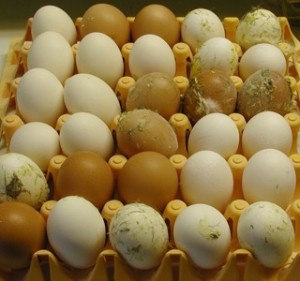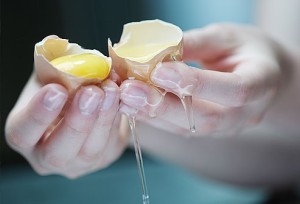What are consumers to do? Ask if that aioli or mayo at the trendy restaurant is made from raw eggs (they invariably say yes)?
 Are consumers to be the critical control point for cross-contamination (that bit of egg goop that invariably ends on the counter when cracking eggs)?
Are consumers to be the critical control point for cross-contamination (that bit of egg goop that invariably ends on the counter when cracking eggs)?
Treat eggs like any other raw food – hazardous waste?
Supermarket giant Coles is under pressure to move eggs off its warm shelves in a bid to protect shoppers from salmonella, matching the practice being rolled out by its main competitor.
Woolworths has pledged to keep eggs in refrigerated cabinets as it continues a nation-wide revamp of its stores.
It is understood dozens of Woolies outlets have had new cabinets installed in the past year, allowing stores to keep fresh eggs chilled below seven degrees, which helps prevent the spread of the harmful salmonella bacteria.
The rollout comes as experts have warned about egg-related salmonella cases, which are on the rise around the country, leading to serious illness and hundreds of hospital admissions each year.
Coles, however, would not disclose if any of its stores would keep eggs refrigerated in response to these calls, prompting shoppers to criticise the company across its social media platforms.
“I will be buying my eggs in Woolworths until you return to displaying them in a chilled area,” one shopper wrote on the company’s Facebook page.
A NSW personal trainer wrote how he had stopped buying eggs from Coles while another shopper pointed out: “It even says on the carton: keep refrigerated.”
The shopper revolt came as another expert joined calls urging stores from large supermarkets to small grocers to be part of an unbroken chain of cold storage for eggs.
 Professor Peter Collignon, an infectious diseases expert at Australian National University’s medical school, said eggs must be treated just like raw meat and kept in a refrigerator at all times.
Professor Peter Collignon, an infectious diseases expert at Australian National University’s medical school, said eggs must be treated just like raw meat and kept in a refrigerator at all times.
“I’m always surprised by the lack of anxiety about this,” he said. “We ought to make the product safer, and we do that by refrigerating it, even at the supermarket.”
Coles declined to comment on Sunday.
It had previously released a one-line statement – “Coles adheres to all health and safety regulations regarding egg storage” – and responded to complaints on social media by denying it was an issue.
Peter Scott, an associate professor at the University of Melbourne’s veterinary school, said keeping eggs chilled in all retail stores would not make a big difference to rising salmonella infection rates.
“For the limited time the eggs are stored at the supermarket unrefrigerated it is, black and white, not significant,” he said.
Dr Scott, who also works as a consultant for the poultry industry, stressed that poor practices at farms, where “dirty eggs” are graded and used when they shouldn’t be, combined with poor food-handling practices, particularly in catering or at restaurants, have been the main culprits behind large outbreaks of the food-borne illness.
“You need two consecutive events: an egg contaminated with salmonella and then the [growth] in a raw egg dish,” he said.
“When [eggs] are made into one of these raw egg products, the replication of salmonella is very dramatic, and that’s where all the food poisoning is coming from.”
“Egg-associated outbreaks of salmonella have been increasing – that is clear,” said Associate Professor Martyn Kirk, an expert in epidemiology at the Australian National University.
He said it was crucial for supermarkets to think about cold storage and egg-related salmonella prevention because the risk of an outbreak, leading to serious illness and hospitalisation, can arise at any point from the farm to the home.
“It is a priority. We’ve seen lots of outbreaks. We should be doing multiple things to try and prevent salmonella occurring.”
Under food safety laws, Australian eggs are washed, inspected for cracks, graded and kept in cool rooms on farms before being transported in refrigerated trucks to reduce the risk of bacterial survival.
 But Brian Ahmed, president of the egg group at the Victorian Farmers Federation, said keeping eggs refrigerated in supermarkets remains the “missing link” in the food safety chain.
But Brian Ahmed, president of the egg group at the Victorian Farmers Federation, said keeping eggs refrigerated in supermarkets remains the “missing link” in the food safety chain.
“It should be treated exactly like raw meat – don’t look at an egg any different way,” he said.
Connor Thomas, adjunct senior lecturer in microbiology at the University of Adelaide, also urged grocery stores to keep eggs in a cool environment.
“That way you minimise the growth, increase the storage time, and minimise the risk,” Dr Thomas said.
The calls come as the rate of salmonella infections rises across the country, with up to 40 per cent of cases linked to contaminated eggs.
In 2015 there were 58 cases per 100,000 people in Victoria, twice the infection rate of 10 years ago, health department data shows.
Food Standards Australia New Zealand last updated egg safety laws in 2011, but left out a retail requirement for cool storage because it concluded temperature was not a factor in spreading salmonella here if eggs are clean and intact.
A spokeswoman said the strain of salmonella present in Australia cannot grow on egg shells, though it could contaminate other foods or get inside the egg when its protective membrane breaks down or the egg is cracked.
“It was acknowledged that refrigeration during retail storage may enhance the quality of eggs,” she said.
“However, this option was excluded early in the standard development process due to the nature of egg shell contamination in Australia and the substantial cost of implementing such an option.”
But Dr Thomas said eggs have been continually implicated in illness and it’s difficult to predict when an outbreak is going to happen, so it is vital to maintain a chain of food safety protection.
A table of Australian egg outbreaks is available at https://barfblog.com/wp-content/uploads/2015/03/raw-egg-related-outbreaks-australia-3-2-15.xlsx
